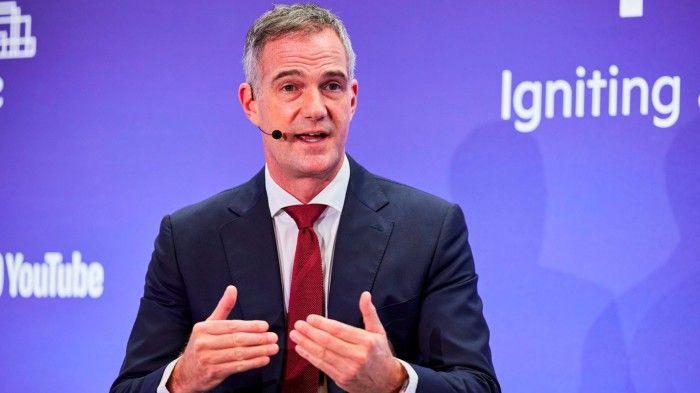UK Government Considers Allowing Private Firms to Profit from NHS Data in AI Push
2 Sources
2 Sources
[1]
Ministers mull allowing private firms to make profit from NHS data in AI push
Anonymised data could help develop treatments, drugs and diagnostic tools but potential misuse worries experts Ministers are considering allowing private companies to make profits from NHS data as part of a push to revolutionise the health service using artificial intelligence, government officials have indicated. Keir Starmer on Monday announced a push to open up the government to AI innovation, including allowing companies to use anonymised patient data to develop new treatments, drugs and diagnostic tools. With the prime minister and the chancellor, Rachel Reeves, under pressure over Britain's economic outlook, Starmer said AI could bolster the country's anaemic growth, as he put concerns over privacy, disinformation and discrimination to one side. "We are in a unique position in this country, because we've got the National Health Service, and the use of that data has already driven forward advances in medicine, and will continue to do so," he told an audience in east London. "We have to see this as a huge opportunity that will impact on the lives of millions of people really profoundly." Starmer added: "It is important that we keep control of that data. I completely accept that challenge, and we will also do so, but I don't think that we should have a defensive stance here that will inhibit the sort of breakthroughs that we need." The move to embrace the potential of AI rather than its risks comes at a difficult moment for the prime minister, with financial markets having driven UK borrowing costs to a 30-year high and the pound hitting new lows against the dollar. Starmer said on Monday that AI could help give the UK the economic boost it needed, adding that the technology had the potential "to increase productivity hugely, to do things differently, to provide a better economy that works in a different way in the future". Part of that, as detailed in a report by the technology investor Matt Clifford, will be to create new datasets for startups and researchers to train their AI models. Data from various sources will be included, such as content from the National Archives and the BBC, as well as anonymised NHS records. Officials are working out the details on how those records will be shared, but said on Monday that they would take into account national security and ethical concerns. Starmer's aides say the public sector will keep "control" of the data, but added that could still allow it to be used for commercial purposes. The prime minister's announcement has triggered worries among some experts about the potential for the data to be misused. Kate Brimsted, a partner at the law firm Shoosmiths, said: "The potential benefits of using NHS data to train AI models are indeed significant, with promising prospects for research advancements, improved patient outcomes, and cost savings. "However, we must not overlook the substantial data privacy, confidentiality and security challenges that accompany this initiative." AI is already used to provide various services across Whitehall, but often in a patchy way with little assessment of the risks and benefits of doing so. A Guardian investigation last year found officials in several departments using AI and machine learning in ways that had a significant impact on the lives of ordinary people. The Department for Work and Pensions was using an algorithm to flag up benefit fraud, which one MP believed had mistakenly led to dozens of people having their payments cancelled removed. A facial recognition tool used by the Metropolitan police was found to make more mistakes recognising Black and Asian faces than white ones under certain settings. And an algorithm used by the Home Office to flag up sham marriages had been disproportionately selecting people of certain nationalities. Starmer's tone on Monday was a departure from that of his immediate predecessor, Rishi Sunak, who organised a global AI summit in the UK in 2023 to discuss the existential risk the technology could pose to humans. The prime minister said: "There are those that are defensive and inhibited and cautious about AI and think that it should be regulated, and that's the only thing that the government needs to do. "The other posture is seeing it's a huge, fantastic opportunity that is going to transform lives, and the role of government is yet to get the framework right, but also to work with the sector to ensure that we're winning the race when it comes to AI. I'm in a second group."
[2]
What does AI plan mean for NHS patient data and is there cause for concern?
Key questions answered around potential use of health data to train AI models under Labour's proposals UK ministers have committed to creating a National Data Library for building artificial intelligence models, as part of an AI action plan. The library will be comprised of state-controlled data, with at least five "high-impact" public datasets being compiled. The prime minister, Keir Starmer, indicated on Monday that patient data from the National Health Service could be part of the library. Health data is a sensitive issue in an age of criminal hackers, cyber espionage by rogue states and general concerns about the robustness of AI tools. Here we answer some of the questions around the potential use of NHS data.
Share
Share
Copy Link
The UK government is exploring the possibility of allowing private companies to use anonymized NHS patient data for AI development, sparking debates on innovation, privacy, and data security.

UK Government Considers AI-Driven NHS Data Utilization
In a bold move towards embracing artificial intelligence (AI) in healthcare, UK ministers are contemplating allowing private companies to profit from National Health Service (NHS) data. This initiative, part of a broader push to revolutionize the health service using AI, has sparked both excitement and concern among experts and the public
1
.Labour's AI Action Plan
Prime Minister Keir Starmer announced a comprehensive AI action plan, emphasizing the unique position of the NHS in driving medical advancements. The plan includes creating a National Data Library for building AI models, with NHS patient data potentially forming a significant part of this resource
2
.Starmer stated, "We have to see this as a huge opportunity that will impact on the lives of millions of people really profoundly." He assured that while embracing AI's potential, the government would maintain control over the data
1
.Potential Benefits and Concerns
The use of anonymized patient data could potentially accelerate the development of new treatments, drugs, and diagnostic tools. This initiative is seen as a way to boost the UK's economic growth and increase productivity in the healthcare sector
1
.However, the proposal has raised concerns among experts. Kate Brimsted, a partner at law firm Shoosmiths, highlighted the "substantial data privacy, confidentiality and security challenges" that accompany this initiative
1
.Related Stories
Current AI Usage and Past Controversies
AI is already being used across various government departments, but often in a fragmented manner with limited risk assessment. Previous investigations have revealed potential issues, such as:
- An algorithm used by the Department for Work and Pensions for flagging benefit fraud, which allegedly led to mistaken cancellation of payments.
- A facial recognition tool used by the Metropolitan police that showed bias in recognizing faces of different ethnicities.
- A Home Office algorithm for detecting sham marriages that disproportionately targeted certain nationalities
1
.
Shift in Government Approach
Starmer's approach marks a departure from his predecessor, Rishi Sunak, who focused more on the potential risks of AI. The current government is positioning itself as seeing AI as a "huge, fantastic opportunity" while acknowledging the need for appropriate frameworks and regulations
1
.As the UK government moves forward with this initiative, balancing the potential for innovation with concerns about data privacy and security will be crucial. The outcome of this policy could significantly impact the future of healthcare, AI development, and data governance in the UK.
References
Summarized by
Navi
Related Stories
Recent Highlights
1
OpenAI secures $110 billion funding round from Amazon, Nvidia, and SoftBank at $730B valuation
Business and Economy

2
Trump orders federal agencies to ban Anthropic after Pentagon dispute over AI surveillance
Policy and Regulation

3
Google releases Nano Banana 2 AI image model with Pro quality at Flash speed
Technology








